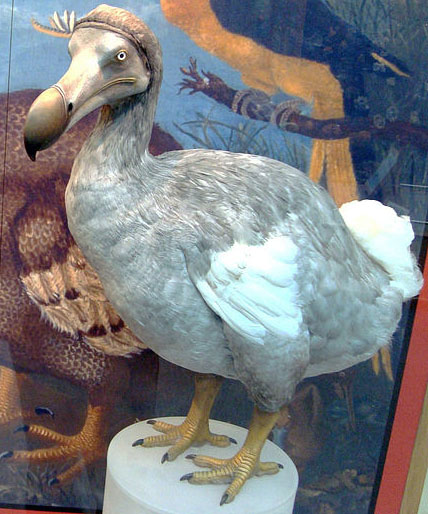 |
| dodo display at the oxford museum of natural history, via bazzadarambler |
So there’s dodo, which Etymonline claims comes from the Portuguese doudo, “fool, simpleton.” I’m unsure whether they called it this as a result of the way it looked — remarkably like one of my gradeschool teachers, I’d like to point out — or how it lacked any natural fear of humans and would just trot right up to whatever sailor arrived onshore. It’s probably a little bit of both.
While I trust Etymonline, it’s worth pointing out for the purposes of this conversation that less accepted theories trace the word back to other sources. Wikipedia has collected them, and they’re almost consistently unflattering. For example, Errol Fuller’s 2002 book Dodo — From Extinction to Icon provides two alternate etymologies: the Dutch words dodoor, “sluggard,” and Dodaars, “fat-ass” or “knot-ass.” Before dodo stuck as a name — and boy did it, seeing as how it’s still a term for a hopelessly stupid person, more than 300 years after the actual dodo ceased to exist — there was walghvogel. An explanation, via Wikipedia’s excerpt of Dutch admiral Wybrand van Warwijck’s journal from his 1597 voyage to Mauritius:
[F]inding in this place great quantity of foules twice as bigge as swans, which they call Walghstocks or Wallowbirdes being very good meat. But finding an abundance of pigeons & popinnayes [parrots], they disdained any more to eat those great foules calling them Wallowbirds, that is to say lothsome or fulsome birdes.Yes, “wallowbirds.” Not exactly a testament to the dodo’s appeal. Others? Wikipedia also notes dronte, meaning “swollen,” and kermisgans, “in reference to the birds fattened for the Kermesse festival,” according to Cheke and Hulme’s 2008 book Lost Land of the Dodo. The poor dodo even gets dinged on the level of its scientific name: After the bird’s extinction, Carl Lineaus named it Didus ineptus, literally “inept dodo.” The current scientific name is Raphus cucullatus, which I’m happy to report is not a ding against the bird’s mental faculties or physical appearance.
Poor dodo. We should have maybe been a little nicer to you while we had the chance, and also then maybe we shouldn’t have introduced all those invasive species that made you die. But in defense of all the name-calling: take another look at that photo of the dodo exhibit. You have to admit: If that face is at all representative of what it looked like in life, it didn’t appear to be having a great time.

No comments:
Post a Comment